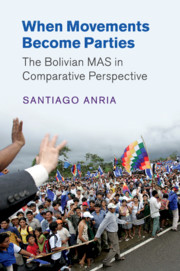Book contents
- When Movements Become Parties
- Cambridge Studies in Comparative Politics
- When Movements Become Parties
- Copyright page
- Dedication
- Contents
- Figures
- Maps
- Tables
- Acknowledgments
- Acronyms and Abbreviations
- Introduction
- 1 Theoretical Framework and Methods
- 2 Origins and Ascendance to Power
- 3 Candidate Selection Patterns
- 4 National Policy-Making Patterns
- 5 The MAS in Comparative Perspective
- Conclusions
- Book part
- References
- Index
- Series page
Introduction
Published online by Cambridge University Press: 19 October 2018
- When Movements Become Parties
- Cambridge Studies in Comparative Politics
- When Movements Become Parties
- Copyright page
- Dedication
- Contents
- Figures
- Maps
- Tables
- Acknowledgments
- Acronyms and Abbreviations
- Introduction
- 1 Theoretical Framework and Methods
- 2 Origins and Ascendance to Power
- 3 Candidate Selection Patterns
- 4 National Policy-Making Patterns
- 5 The MAS in Comparative Perspective
- Conclusions
- Book part
- References
- Index
- Series page
Summary

- Type
- Chapter
- Information
- When Movements Become PartiesThe Bolivian MAS in Comparative Perspective, pp. 1 - 29Publisher: Cambridge University PressPrint publication year: 2018

